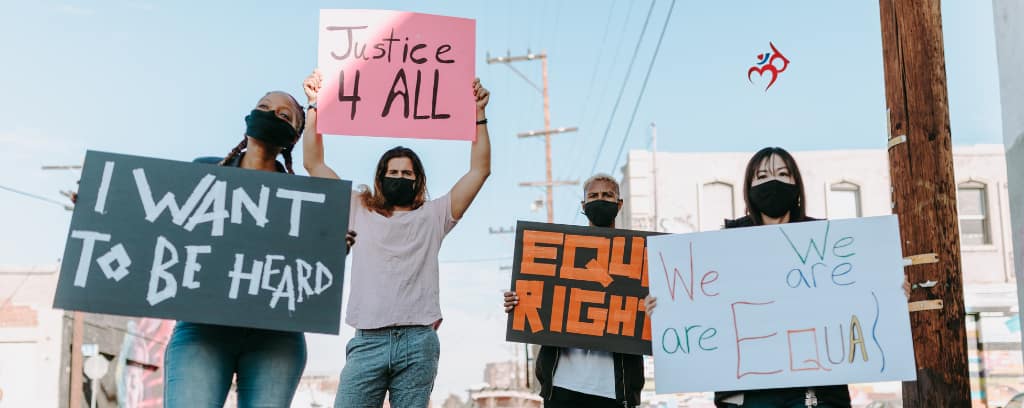Licensed professionals and other high achievers might choose to mediate workplace discrimination claims for a variety of reasons. One of the biggest motivators is the desire to make the nightmare end.
If the complaint has been filed against you, it can be confusing and terrifying. Part of you might want to fight back. Another might feel like everything you sacrificed for is about to disappear.
Maybe you thought you were the last person who would ever be accused. After all, your work is focused on diversity, and you’ve worked hard to make sure you’re including people with a variety of backgrounds and identities. You are the face of mutual respect and model it even when you are tired or stressed out.
Yet here you are, facing a complaint. This doesn’t make sense. You wonder if you the one being targeted. And, if so, why? Does anyone care about the impact this is having on you, or has a decision already been made before a fair and impartial investigation?
These are questions the courts and administrative agencies often overlook, but they are important aspects of discrimination mediation.
Why Court Is the Last Resort
Litigation, especially in sensitive discrimination cases, comes with significant downsides:
- The Drain. Court battles are expensive, time-consuming, and stressful. They are known to drain bank accounts and postpone important life decisions. Even winning can feel like losing.
- The Damage. The adversarial nature of legal proceedings tends to destroy relationships, making future collaboration nearly impossible. The emotional toll also impacts co-worker morale and productivity.
- The Public Eye. Court cases are public, potentially damaging reputations. Mediation offers confidentiality.
- The Limited Fixes. Legal remedies for discrimination are often limited to money damages or job reinstatements that do not address the core issues. This makes it highly unlikely the parties will work well together going forward or that the root causes will be fully addressed.
The fact-based decision-making process dehumanizes matters that are deeply human. Conversely, mediation focuses on the human interests driving conflicts and attempts to heal them as part of the solution.
What is Discrimination Mediation?
Discrimination mediation is a confidential process where a neutral third party helps those involved in a discrimination complaint:
- Talk through the issues
- Listen to understand each other
- Work together toward a resolution they both agree on
The mediator doesn’t decide who is right or wrong. Instead, she helps the parties define the conflict succinctly, identify what personal needs are driving it, and explore practical solutions. This requires deep, “third ear” listening and an ability to keep putting judgments aside, knowing they are irrelevant. Only the parties’ beliefs and judgments matter because they are the ones who must live with the outcome.
Key Benefits of Choosing Discrimination Mediation
Why choose discrimination mediation over court?
- Confidentiality. Discussions remain private, protecting reputations and allowing for more open dialogue. This does not, however, mean that parties won’t be held accountable for inappropriate workplace behavior.
- Control Over the Outcome. Unlike in court, where a judge or jury decides your fate, in mediation, you and the other party or parties decide the solution. This allows for creative, tailored agreements that meet your specific needs. You can play with the full range of possibilities and co-create the future(s) you want.
- Preserve Relationships, or At Least Part Amicably. Mediation focuses on communication, offering a chance to repair working relationships. If separation is necessary, you can part ways more respectfully, avoiding the bitterness of litigation and awkward encounters when your paths cross again in this small, interconnected world.
- Speed and Affordability. The mediation process can begin before litigation is filed. You might need to complete a fair and impartial investigation first, but it will still generally be much quicker and less costly to mediate than litigate.
- Address the Real Issues. Most natural, human responses are discouraged in court because they can disrupt what is intended to be an efficient, objective system. Not in mediation. We allow you to free the emotions (as long as they don’t cause new harms) and explore the root causes of the conflict, so we solve the right problems. This can lead to policy changes, training, and culture shifts that both prevent future problems and build a more peaceful, resilient workforces.
The Third Ear Approach
To help navigate these sensitive disputes, we bring decades of experience in:
- Human Resources
- Employment Law
- Conflict Resolution
- Diverse Workplaces
- Fair and Impartial Investigations
We focus on listening deeply to understand the underlying needs and guide parties toward sustainable, mutually beneficial solutions.
Choose Peaceful Resolution
When facing a discrimination claim, you have a choice. Litigation often leads to a drawn-out fight that damages everyone involved. On the other hand, discrimination mediation offers a confidential, efficient, and empowering alternative focused on finding real solutions to very human problems that tend to repeat if not addressed fully.

